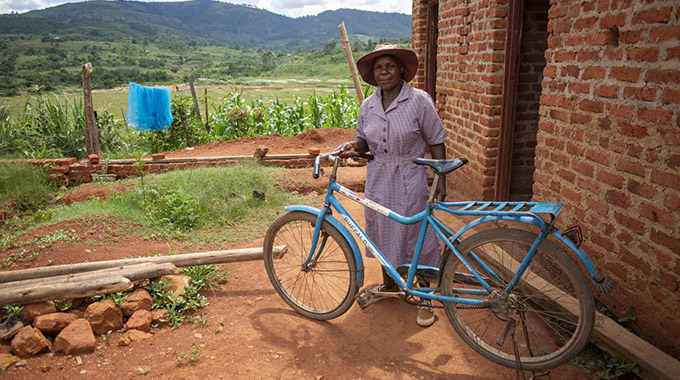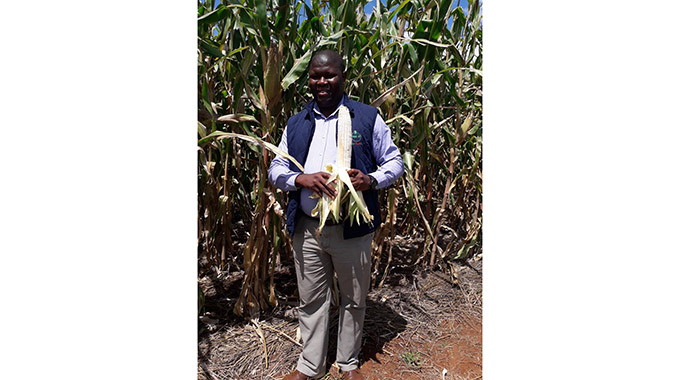Village Health Workers embrace COVID-19 training

John Mokwetsi
Obert Matondokosi, 34, the only male trainee of 40 new Village Health Workers (VHWs) who underwent a 3-week pre-service and COVID-19-themed training in Chimanimani District, feels obligated to carry the community’s concerns on his shoulders.
Obert is from Gadyadza village, close to the border with Mozambique. His village was one of the areas that suffered the effects of Cyclone Idai in March 2019. Heavy rains that resulted in landslides washed away houses and resulted in many deaths and loss of livelihoods.
“I lost friends and relatives to Cyclone Idai. This district, with the help of UNICEF, World Bank and other partners, is slowly coming to terms with the devastating effects of those torrential rains that scarred communities,” he said.
“The best we can do is to help each other to come to terms with what we went through. We are a resilient people and I view this COVID-19 training opportunity as a chance to help continue to support my community the way I also did in 2019,” Obert said.

Obert, and 39 others from several villages, said he finds the training essential for understanding what the pandemic is, how it is transmitted, how it is prevented and who is at most risk. “After these three weeks of learning and discussions, I now understand how important it is to maintain good personal hygiene standards and social distancing as critical prevention measures to minimize the risk of contracting COVID-19.”
“COVID-19 is an infectious disease that can be transmitted by getting into contact with droplets from coughing and sneezing from a person with COVID-19 or touching unclean surfaces or equipment. If people do not wash their hands with soap and alcohol-based hand sanitisers this increases the risk of COVID-19. I learnt about the signs and symptoms of the disease that I can report immediately to the clinic for timely treatment.,” said Obert, continuing “that there is no vaccine available and prevention is the key!”
Obert was also among 400 VHWs who received bicycles in Chimanimani and Chipinge from UNICEF with funding support from the World Bank Zimbabwe Idai Recovery Project (ZIRP). This support contributed to increasing the number of VHWs that received bicycles this year to 2,400 in 31 rural districts across the country for improved access to marginalised areas and health facilities.
“This bicycle is appreciated. I can now cover many households. It used to be hard to cover a large area but this will help many households that I can now access.,” he said.
Multi-donors working together to help prevent COVID-19
In Chimanimani, the VHWs are trained through the Ministry of Health and Child Care, with collaborative support from UNICEF through funding from the World Bank (ZIRP) and the Health Development Fund (HDF) supported by UK Aid, EU, SIDA-Sweden, Irish Aid and GAVI.
VHWs are vital in that they deliver health services to the communities by conducting health promotion services ranging from maternal, neonatal and child health, nutrition, WASH related information and management of common childhood illnesses.
In the current COVID-19 context, their role will expand beyond engaging communities in prevention of COVID-19 to include detection and responses – contributing to containing the outbreak. Since the beginning of the year, 714 VHWs have been trained nationwide. VHWs receive ongoing training, as well as uniforms and health commodities for their work.
Many are also given a bicycle, which provides a low-cost and sustainable mode of transport that allows them to travel up to 20 km a day to reach remote rural families. Village health workers play an essential role in the primary healthcare system in Zimbabwe.
Continued training critical in fighting COVID-19
For Viola Tambarane, a Primary Care Nurse (PCN) at Nyanyadzi Clinic in Chimanimani – training the new batch of VHWs –came at a time she felt duty bound to assist in fighting against the pandemic that is steadily on the rise in Zimbabwe.
“The good thing is that the training is happening at an isolated place with few people. The hall we are using is big enough to maintain social distancing. We are also equipped with masks, soap and alcohol-based hand sanitisers,” Viola said adding that she was impressed with the uptake of information by the trainees.
The training has looked at preventative measures, symptoms, defining coronavirus and demystifying it as well as information packaging that helps to impact on behavioural change in addition to the standard curriculum for new VHWs.
Another PCN trainer, Shylet Tsangamidzi at Nyabamba clinic also in Chimanimani said frontline workers were a critical component of the fight of the pandemic but pointed out that despite the trainees having the full knowledge, there were expected challenges in the work that awaits them.
“The concern is that the trainees do not feel that they have the fully required protective clothing to conduct the work expected of them in the current context. VHWs also have other health related issues that they are expected to provide care for to ensure continuity of services,” she said.
“So, we are looking at providing the VHWs having personal protective equipment (PPE) such as surgical masks, gloves, aprons including infrared thermometers for screening and other vital kits to be able to work effectively with appropriate infection and prevention measures,” Viola said.
VHW essential to communities in Zimbabwe
Farai Khosa, Chimanimani District Nursing Officer said the VHWs help their communities to come face to face with the reality of the situation on a daily basis.
“UNICEF and their partners have helped us to shape the trainings that will go a long way in filling the information gaps. Yes, we have challenges, but we have instructed our VHWs to also be innovative and use homemade masks for example,” Farai said.
During training, the VHWs were also taught how to make cloth face masks, and they are expected to make some for the most vulnerable including the elderly in their respective communities.
“An empowered community is a community that can protect its people. This is what we are happy to embrace,” he said. -UNICEF Zimbabwe







Comments